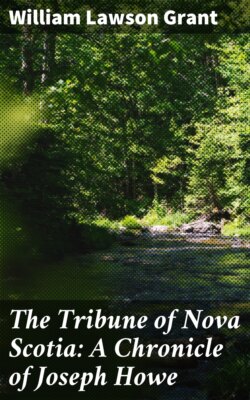The Tribune of Nova Scotia: A Chronicle of Joseph Howe

Реклама. ООО «ЛитРес», ИНН: 7719571260.
Оглавление
William Lawson Grant. The Tribune of Nova Scotia: A Chronicle of Joseph Howe
The Tribune of Nova Scotia: A Chronicle of Joseph Howe
Table of Contents
CHAPTER I
NOVA SCOTIA
CHAPTER II
BIRTH AND TRAINING
CHAPTER III
THE OLD COLONIAL SYSTEM
CHAPTER IV
THE FIGHT FOR RESPONSIBLE GOVERNMENT
CHAPTER V
RAILWAYS AND IMPERIAL CONSOLIDATION
CHAPTER VI
BAFFLED HOPES
BIBLIOGRAPHICAL NOTE
INDEX
Отрывок из книги
William Lawson Grant
Published by Good Press, 2021
.....
In the summer months he went to a school in the city, taught by a Mr Bromley on Lancaster's system. 'What kind of a boy was Joe?' was asked of an old lady who had gone to school with him sixty years before. 'Why, he was a regular dunce; he had a big nose, a big mouth, and a great big ugly head; and he used to chase me to death on my way home from school,' was her ready answer. It is easy to picture the eager, ugly, bright-eyed boy, fonder of a frolic with the girls than of Dilworth's spelling-book. He never had a very handsome face; his features were not chiselled, and the mould was not Grecian. Face and features were Saxon; the eyes light blue, and full of kindly fun. In after years, when he filled and rounded out, he had a manly open look, illumined always as by sunlight for his friends, and a well-proportioned, 'buirdly' form, that well entitled him to the name of man in Queen Elizabeth's full sense of the word. And when his face glowed with the inspiration that burning thoughts and words impart, and his great deep chest swelled and broadened, he looked noble indeed. His old friends describe him as having been a splendid-looking fellow in his best days; while old foes just as honestly assure you that he always had a 'common' look. It is easy to understand that both impressions of him could be justifiably entertained. Very decided merits of expression were needed to compensate for the total absence of beard and for the white face, into which only strong excitement brought any glow of colour.
Howe was fortunate in his father. John Howe was a Loyalist, of Puritan stock which had come to Massachusetts in the seventeenth century. When the American Revolution broke out, alone of his family he was true to the British flag. Many years afterwards his son told a Boston audience that his father 'learned the printing business in this city. He had just completed his apprenticeship, and was engaged to a very pretty girl, when the Revolution broke out. He saw the battle of Bunker's Hill from one of the old houses here; he nursed the wounded when it was over. Adhering to the British side, he was driven out at the evacuation, and retired to Newport, where his betrothed followed him. They were married there, and afterwards settled at Halifax. He left all his household goods and gods behind him, carrying away nothing but his principles and the pretty girl.'
.....